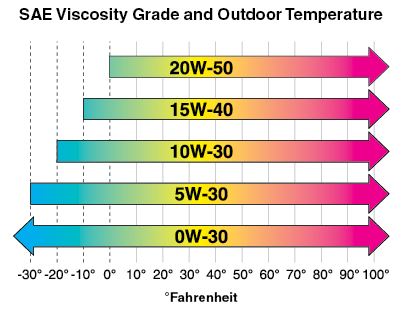Can I Use 0w20 Instead Of 5w20 In My Ford? – Explore The Fuel Facts In 2023!
When it comes to taking care of your Ford vehicle, selecting the right motor oil is crucial. One common question that Ford owners often have is, “Can I use 0W20 instead of 5W20 in my Ford?”
Yes, you can typically use 0W-20 instead of 5W-20 in your Ford vehicle. Using 0W-20 in colder weather also makes your car run more smoothly and efficiently than 5W-20. Still, it’s essential to consult your owner’s manual or a professional mechanic for specific recommendations and to ensure it meets the manufacturer’s specifications.
However, through this informative article, we’ll address this query and provide expert insights and advice to help you decide about the oil you use in your Ford.
What Is The Sae Viscosity Rating System? – Understand The Basics First!

The Society of Automotive Engineers, known as SAE, created the SAE code for regular engine oil to make it useful and organised in the automotive industry.
This code is the primary indicator of the oil’s thickness and temperature suitability, ensuring your vehicle’s safety and performance.
Let’s use it as an example to simplify and clarify what 0W-20 oil is all about.
- The initial “0” indicates the oil’s thickness when you start the engine in cold conditions, and the “W” that follows signifies its usability in winter or cold weather.
- Next, the “20” represents the oil’s thickness in higher temperatures. A lower number means the oil is thinner and has less friction.
Factors To Consider When Choosing Between 5w-20 and 0w-20 – Take A Deep Analysis!
1. Your car’s Manual Is Crucial In Selecting Oil:
No matter how well the components and factors fit together, if your car manual specifies 0w20 oil, then stick to using 0w20. Only in extreme situations should you consider altering this.
However, there are some cases where certain units suggest using either 5w20 or 0w20 oil, while others, such as my Ford vehicles, only suggest 5w20. The manuals emphasize using oils with higher viscosity.
2. The Location Or Climate In Which You Use Your Ford Car:
Another important consideration is your location. Why does it matter? Because where you live determines the weather or climate you’ll encounter.
For instance, if you have a Jeep in Michigan, you don’t necessarily have to follow the 0w20 oil recommendation strictly.
Furthermore, in a place like Florida, using either 5w20 or 0w20 isn’t very beneficial because the temperatures regularly exceed the recommended 20 degrees Celsius.
3. Last But Not Least, Must Check The Rating Of Viscosity:
As discussed earlier, the lower the number, the thinner the oil, which translates to smoother flow. Just remember that oils naturally become thicker when they cool down and thinner when heated up!
Here you go! Now, you have to take a look at the benefits of using 0W20 instead of 5W20.
4 Amazing Advantages Of Using The 0w20 In Your Ford – Find Out The Benefits!

1. It Can Improve Fuel Efficiency:
This oil’s lower viscosity reduces friction within the engine components. As a result, your Ford engine operates more smoothly and efficiently, which can lead to significant fuel savings over time.
In an era where fuel prices continue to fluctuate, improving your vehicle’s fuel economy is a welcome advantage.
Conversely, 0W20’s lower viscosity may increase oil consumption in older engines or those with high mileage.
2. Excellent Cold-Start Protection:
Cold weather can be tough on your engine, especially when you first start it up. The “0” in 0W20 means that it flows really well in cold temperatures.
So, on those frosty winter mornings, the oil moves easily through your engine, giving it the essential lubrication it needs right when you start the car. This helps protect your engine from early wear and tear, making it last longer.
3. This Oil Will Also Enhance Engine Performance
With 0W20 motor oil, you can expect your Ford’s engine to perform optimally. The reduced friction and improved lubrication properties help maintain the engine’s performance over time.
This means your vehicle will continue delivering the power and responsiveness you expect, whether navigating city streets or cruising down the highway. It can also extend the life of the engine.
4. Compatibility Of 0w20 With Modern Engines
Many newer Ford models are designed to operate efficiently with 0W20 motor oil. Manufacturers often recommend this oil viscosity to maximize engine performance and longevity.
Using the recommended oil ensures your vehicle operates as intended and maintains its warranty coverage.
Thats all! If you want to know further details about these motor oils, you must read people’s discussions on the forum-based community website.
Comparison Of 0w20 And 5w20 Motor Oils – Let’s Clear Your Doubts About Fuel!
| Properties | 0W20 Motor Oil | 5W20 Motor Oil |
| Viscosity at Cold Start (W) | 0 | 5 |
| Cold Temperature Performance | Better for Cold Starts | Not a good Cold Start Performance |
| Fuel Efficiency | May Slightly Improve Fuel Efficiency | Standard Fuel Efficiency |
| Temperature Range | Suitable for Cold Climates | Suitable for Moderate Climates |
| Engine Wear Protection | Provides Good Protection | Offers Good Engine Protection |
| Common Applications | Often used in newer, high-efficiency engines | Commonly used in a wide range of vehicles |
| Environmental Impact | Thinner Oil May Lead to Reduced Friction | Slightly Thicker Oil May Offer Enhanced Wear Protection |
| Cost | High in cost | Low in cost |
The Best Fuel That We Recommend To You – Must Pay Attention!
E85 (Flex-Fuel):

You can use this ethanol-gasoline blend if you have a flex-fuel Ford vehicle compatible with E85. This is a type of fuel that contains a higher percentage of ethanol compared to standard gasoline. E85 is a blend of 85% ethanol and 15% gasoline.
We also previously compiled a guidebook on this topic. You can read everything about E85 fuel there.
Enjoy your smooth ride! By reading the above discussion on “Can I use 0w20 instead of 5w20?” You can easily select the best 0W20 oil for your Ford car.
Frequently Asked Questions
1. Can I mix 0w20 and 5w20 motor oils?
Yes, it’s safe to mix them, but because they have different viscosities and are not entirely compatible, it could potentially harm your engine over time. Make sure your oil reservoir is empty before doing so!
2. How frequently should I get an oil change for my engine?
A good rule to follow is to change the oil every 7,500 to 10,000 miles or roughly every 12,000 to 16,000 kilometers.
3. Will my warranty remain valid if I use a different motor oil viscosity?
Yes, your warranty will still be covered if the oil change was performed by your brand’s authorized dealer or manufacturer. However, if you had it done by a different dealer or a third-party shop, or if you did it yourself, many brands may void the warranty, leaving you without coverage.
4. Is it okay to put a 5W20 in a 0W20 engine?
You can use 0W-20 oil unless the weather is extremely cold, but avoid using it in a 5W-20 engine when it’s very hot, as it won’t work well. The 0W-20 oil won’t work in such heat because it’s less effective and thinner.
Final words
Let me conclude this article.
Absolutely yes. You can use 0W20 instead of 5W20 in your Ford if it’s recommended in your owner’s manual or by a qualified mechanic. Before selecting the best oil for your Ford, you must consider the following factors: the car’s manual, location or climate, and viscosity rating. Always follow manufacturer specifications for the best engine performance and longevity.
